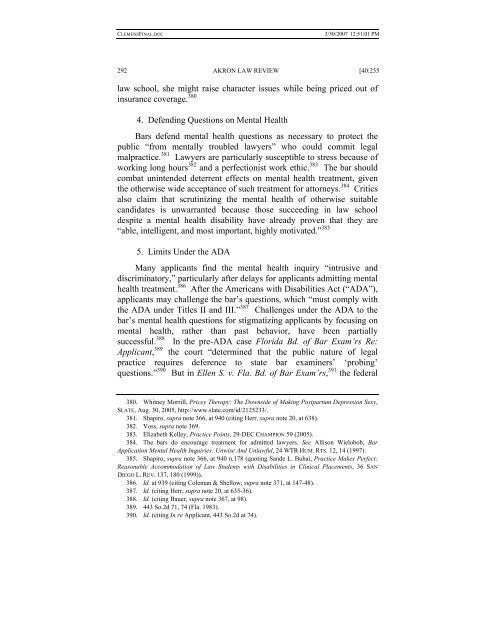Facing the Klieg Lights: Understanding the "Good Moral Character"
Facing the Klieg Lights: Understanding the "Good Moral Character"
Facing the Klieg Lights: Understanding the "Good Moral Character"
You also want an ePaper? Increase the reach of your titles
YUMPU automatically turns print PDFs into web optimized ePapers that Google loves.
CLEMENSFINAL.DOC<br />
3/30/2007 12:51:01 PM<br />
292 AKRON LAW REVIEW [40:255<br />
law school, she might raise character issues while being priced out of<br />
insurance coverage. 380<br />
4. Defending Questions on Mental Health<br />
Bars defend mental health questions as necessary to protect <strong>the</strong><br />
public “from mentally troubled lawyers” who could commit legal<br />
malpractice. 381 Lawyers are particularly susceptible to stress because of<br />
working long hours 382 and a perfectionist work ethic. 383 The bar should<br />
combat unintended deterrent effects on mental health treatment, given<br />
<strong>the</strong> o<strong>the</strong>rwise wide acceptance of such treatment for attorneys. 384 Critics<br />
also claim that scrutinizing <strong>the</strong> mental health of o<strong>the</strong>rwise suitable<br />
candidates is unwarranted because those succeeding in law school<br />
despite a mental health disability have already proven that <strong>the</strong>y are<br />
“able, intelligent, and most important, highly motivated.” 385<br />
5. Limits Under <strong>the</strong> ADA<br />
Many applicants find <strong>the</strong> mental health inquiry “intrusive and<br />
discriminatory,” particularly after delays for applicants admitting mental<br />
health treatment. 386 After <strong>the</strong> Americans with Disabilities Act (“ADA”),<br />
applicants may challenge <strong>the</strong> bar’s questions, which “must comply with<br />
<strong>the</strong> ADA under Titles II and III.” 387 Challenges under <strong>the</strong> ADA to <strong>the</strong><br />
bar’s mental health questions for stigmatizing applicants by focusing on<br />
mental health, ra<strong>the</strong>r than past behavior, have been partially<br />
successful. 388 In <strong>the</strong> pre-ADA case Florida Bd. of Bar Exam’rs Re:<br />
Applicant, 389 <strong>the</strong> court “determined that <strong>the</strong> public nature of legal<br />
practice requires deference to state bar examiners’ ‘probing’<br />
questions.” 390 But in Ellen S. v. Fla. Bd. of Bar Exam’rs, 391 <strong>the</strong> federal<br />
380. Whitney Morrill, Pricey Therapy: The Downside of Making Postpartum Depression Sexy,<br />
SLATE, Aug. 30, 2005, http://www.slate.com/id/2125233/.<br />
381. Shapiro, supra note 366, at 940 (citing Herr, supra note 20, at 638).<br />
382. Voss, supra note 369.<br />
383. Elizabeth Kelley, Practice Points, 29-DEC CHAMPION 59 (2005).<br />
384. The bars do encourage treatment for admitted lawyers. See Allison Wielobob, Bar<br />
Application Mental Health Inquiries: Unwise And Unlawful, 24 WTR HUM. RTS. 12, 14 (1997).<br />
385. Shapiro, supra note 366, at 940 n.178 (quoting Sande L. Buhai, Practice Makes Perfect:<br />
Reasonable Accommodation of Law Students with Disabilities in Clinical Placements, 36 SAN<br />
DIEGO L. REV. 137, 180 (1999)).<br />
386. Id. at 939 (citing Coleman & Shellow, supra note 371, at 147-48).<br />
387. Id. (citing Herr, supra note 20, at 635-36).<br />
388. Id. (citing Bauer, supra note 367, at 98).<br />
389. 443 So.2d 71, 74 (Fla. 1983).<br />
390. Id. (citing In re Applicant, 443 So.2d at 74).
















